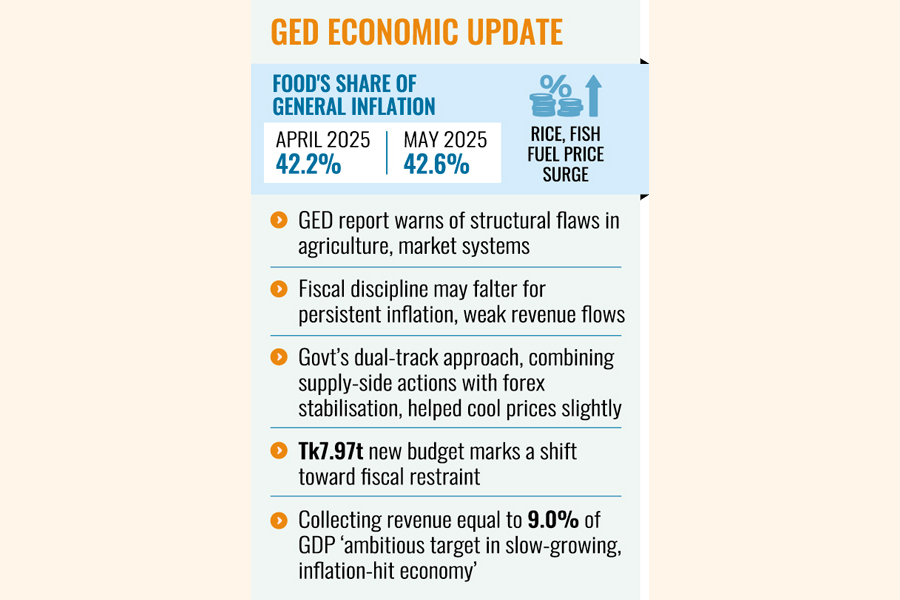
Published :
Updated :

 Transitory inflation relief may be masking long-term risks that could derail Bangladesh's economic recovery, an official outfit alerts as pressures of prices persist.
Transitory inflation relief may be masking long-term risks that could derail Bangladesh's economic recovery, an official outfit alerts as pressures of prices persist.
High prices of essential food items, particularly rice and fish, have kept food inflation stubbornly high, despite signs of macroeconomic stabilisation and government efforts to tame prices, says the General Economic Division (GED) of the Planning Commission.
In its latest report, the GED reveals that these two staples alone accounted for a staggering 62 per cent of total food inflation in May, highlighting deep-rooted structural weaknesses in agriculture and supply chains.
The June issue of the 'Economic Update and Outlook' shows that headline inflation fell to 9.05 per cent in May -- the lowest since the post-pandemic and Ukraine war-induced inflationary surge.
However, volatility in essential-commodity markets continues to plague consumers, and the GED warns that short-term relief may be masking long-term risks that could derail the broader economic recovery.
The General Economic Division released its publication Tuesday, underscoring continued volatility in the essential-commodity markets.
It points out that the medium varieties of rice alone contributed 20.46 per cent to the food inflation, followed by significant inputs from coarse rice and Hilsa fish. Price drops in potatoes and poultry saved the situation with modicum relief, but were insufficient to counteract the broader upward pressure from staple items.
"Inflationary pressures remain a serious concern," the report notes. The government's dual-track approach, combining supply-side actions with foreign-exchange stabilisation, has helped cool prices slightly, but long-term risks persist.
Despite latest signs of macroeconomic stabilisation, the GED alerts, Bangladesh's economy remains burdened with persistent inflation, weak revenue mobilisation, and external-sector vulnerabilities.
The report also analyses several issues of the national budget worth Tk 7.97 trillion for the next fiscal year (FY 2025-26) approved recently and marks a shift toward fiscal restraint.
The GED says the budget aims to reduce the deficit to 3.62 per cent of GDP but successful implementation of the budget is contingent upon collecting revenue equal to 9.0 per cent of GDP -- an ambitious target in a slow-growing, inflation-hit economy.
The budget sharply reduces bank borrowing targets by 24 per cent compared to the current fiscal year, but weak revenue inflows have already led to increased government dependence on bank financing.
Although bank-deposit growth briefly improved in March due to increased remittances and regained clientele trust, high inflation continues to erode real savings.
The division found strong export-sector performance in May, following a seasonal low in April, but expressed concern over persisting pressure on exchange rate.
Meanwhile, Bangladesh's nominal and real effective exchange rates point to a loss in external competitiveness, driven by structural imbalances and rising import costs, it says.
Foreign-exchange reserves showed signs of recovery, peaking in April, but usable reserves remain under pressure as reflected in BPM6-adjusted figures.
The GED report applauds initiatives such as digital budgeting, tariff cutbacks in preparation for LDC graduation, and expansion of social- protection schemes.
Daily wages for employment-support programmes are set to rise from Tk 400 to Tk 500, and monthly allowances for the disabled and widows will also increase.
But GED stresses that these measures must be backed by reforms in banking, capital market, and governance to deliver real impact.
A noteworthy feature of the FY26 budget is recognising women's unpaid domestic and caregiving work in GDP estimates -- a significant shift in economic accounting.
"While the fiscal framework signals a return to discipline, risks around inflation, exchange-rate volatility, and revenue shortfalls could undermine budget execution," the report concludes.
The government targets 5.5-percent GDP growth and 6.5-percent inflation for the next fiscal year, but GED warns that without urgent reforms, these targets may prove overly optimistic in an increasingly uncertain economic environment.
jahid.rn@gmail.com


 For all latest news, follow The Financial Express Google News channel.
For all latest news, follow The Financial Express Google News channel.